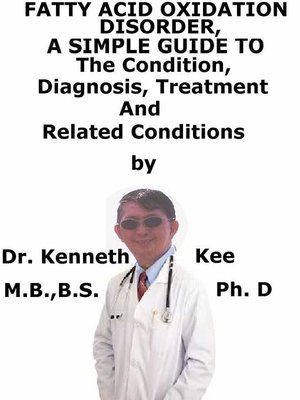Fatty Acid Oxidation Disorders, a Simple Guide to the Condition, Diagnosis, Treatment and Related Conditions
ebook
By Kenneth Kee

Sign up to save your library
With an OverDrive account, you can save your favorite libraries for at-a-glance information about availability. Find out more about OverDrive accounts.
Find this title in Libby, the library reading app by OverDrive.



Search for a digital library with this title
Title found at these libraries:
| Loading... |
This book describes Fatty Acid Oxidation Disorders, Diagnosis and Treatment and Related Diseases
Fatty acid oxidation disorders (FODs) are a cluster of genetic metabolic disorders that are featured by the abnormal breakdown of fatty acids to energy in the body.
This process needs fat and oxygen, and is termed fatty acid oxidation.
It is the same as burning fuel in a fireplace but instead of heat, the body forms chemical energy by this method of fat burning.
Due to the inherited mutation or FOD, affected persons cannot burn fats successfully for energy production.
Storage fat is the second energy supply for the body (the first is glucose or sugar).
When the glucose is used up, the body breaks down storage fat for energy.
Any inability to metabolize fatty acids absolutely due to an inherited blockage in the energy production pathway leads to the collection of the unused fat by-products toxic to the body.
A number of enzymes are required to break down fats in the body (a process called fatty acid oxidation).
Problems with any of these enzymes can produce a fatty acid oxidation disorder.
People with FODs cannot properly break down fat from either the food they eat or from fat stored in their bodies.
The FODs comprise many different disorders such as:
1. Disorders of plasma membrane functions
Carnitine uptake defect
Long chain fatty acid transport/binding defect
2. Disorders of fatty acid transport across the mitochondrial membranes
Primary carnitine deficiency CPT syndromes
CPT1 and 2 deficiencies
CACT deficiency
3. Disorders of long chain fatty acid β-oxidation:
Very long chain acyl-CoA dehydrogenase (VLCAD) deficiency,
Tri-functional protein deficiency, isolated long-chain L3-hydroxyl-CoA dehydrogenase deficiency,
4. Disorders of Medium chain fatty acid β-oxidation:
Medium chain acyl-CoA dehydrogenase (MCAD) deficiency,
Medium- and short-chain L3-hydroxyl-CoA dehydrogenase deficiency
Medium-chain 3-ketoacyl-CoA thiolase deficiency
5. Disorders of short chain fatty acid β-oxidation:
Short chain acyl-CoA dehydrogenase (SCAD) deficiency
Fatty acids indicates an important source of energy in periods of catabolic stress linked to increased muscular activity, fasting or febrile illness, where as much as 80% of the energy for the heart, skeletal muscles and liver could be obtained from them
The symptoms of FODs are linked to the poor energy production and the effects of the toxic buildup of waste products and, depending on the medical needs for energy, can fluctuate widely even among members of the same family.
There may be a range of medical manifestations ranging from:
1. Mild liver dysfunction,
2. Cardiomyopathy and
3. Skeletal myopathy to
4. Severe liver disease that may present with a recurrent Reye-like syndrome starting in the infantile period with hepatic steatosis,
5. Unexplained hepatic failure and
6. Non-ketotic hypoglycemia.
Stressors such as fasting may exacerbate the hepatic disease.
Episodes of hypoglycemia can happen with or without other symptoms.
Hypoglycemia can induce a child to feel weak, shaky or giddy with cold clammy skin.
If not treated, it can lead to coma, and possibly death.
The main laboratory studies are routine labs (CBC, BMP, hepatic panel, ammonia, lactate and CPK), acylcarnitine levels, MS/MS analysis of organic acids, plasma carnitine, acylcarnitines and urine acylglycine analysis, with a definitive diagnosis based on mutation analysis or measurement of specific enzyme activity.
A low fat, high carbohydrate diet is recommended.
Dietary...






